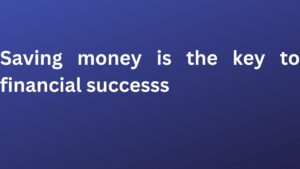Set clear financial goals.
The Ultimate Guide to Setting Clear Financial Goals
Set clear financial goals: The ultimate guide to securing your financial future and achieving peace of mind.
Setting clear financial goals guides you toward fiscal health and personal fulfillment by giving you a clear direction to work towards, ensuring that your financial decisions align with your values and aspirations, and ultimately providing a sense of purpose and satisfaction as you achieve your milestones.
For example, in 5 years, I aim to establish a solid financial foundation with =savings=, investments, and some passive income streams. In 20 years, I envision myself as financially independent, with enough wealth to support my desired lifestyle and pursue my passions without worrying about money. In 30 years, I hope to have achieved significant wealth accumulation, allowing me to leave a legacy for my loved ones and contribute to important causes.
Without a structured plan for managing your finances, you’ll probably continue to navigate through your financial life similarly as you are currently. This means you may not progress significantly towards your financial goals and are in similar financial situations or struggles. A lack of planning often leads to inertia or reactive decision-making rather than intentional steps towards improvement and growth.
Financial goals serve as a navigational tool, guiding you toward the things that hold significance in your life. They provide a clear direction, helping you prioritize your efforts and resources toward achieving what truly matters to you financially.
Setting financial goals simplifies the process of determining which actions are necessary. A clear roadmap lets you quickly identify and prioritize the steps needed to accomplish your objectives.
It’s time to seize control of your finances and overall life. Keep reading to discover how to empower yourself to achieve greater financial security and personal fulfillment.
How to save money: Establish specific and achievable financial goals, such as setting aside a certain percentage of your monthly income for savings. Regularly track your progress towards these goals and adjust your budget to save towards your objectives consistently.
How to improve your budget Take a moment to envision your desired financial future. Now, let’s dive into techniques to improve your budget, empowering you to align your spending with your long-term goals and aspirations.
Setting clear financial goals is crucial for achieving financial success. With a clear vision, let’s explore strategies for improving your budget and effectively managing your finances.
Set clear financial goals.
Breaking free from the cycle of merely surviving financially necessitates adopting a prudent and proactive approach that empowers individuals to take control of their financial circumstances. Within this journey towards financial liberation, it becomes imperative to embrace practical steps to foster progress and ultimately achieve enduring financial stability.
Understanding Financial Goals
A financial goal is a specific objective related to managing money, such as saving for retirement, paying off debt, or buying a home.
The Importance of Clear Financial Goals
Clear financial goals are indeed crucial for effective financial planning:
Without clear goals, it’s easy to become sidetracked by short-term wants, leading to impulsive spending and saving patterns that undermine financial health.
Clear goals provide direction and purpose, making it easier to prioritize expenses, save diligently, and invest wisely.
Clear financial goals transform abstract aspirations and dreams into actionable targets with specific timelines and amounts, enabling you to track progress, stay motivated, and accomplish your goals, such as retiring comfortably or buying a home.
Clear financial goals transform abstract aspirations and dreams into actionable targets with specific timelines and amounts, enabling you to track progress, stay motivated, and accomplish your goals effectively.
Examples of such goals include retiring comfortably and buying a home.
Clear financial goals are essential for effective financial planning. They provide a roadmap for managing finances, making informed decisions, and achieving desired outcomes.
Make your goals
Undefined goals indeed yield undefined results. One major reason people don’t hit their financial goals is that they are too vague. Goals like “I want to be rich” or “I want a new house” are undefined; you need to be more specific.
Exactly what you want requires clarity: Define how much money you need to consider yourself “rich.”
Specify the number of bedrooms, bathrooms, and the house size you desire for precise goal setting.
Define your goals
My goal is to save money and become debt-free:
Yes, I want to save money and become debt-free. I aim to save $10,000 within the next 18 months. I currently have $8,000 in debt. I plan to allocate $400 monthly towards debt repayment, aiming to be debt-free within the next two years.
Break your goals down into mini-goals.
If your goal is to save money, breaking it down into mini-goals can be helpful.
Determine how much you can save each pay period. For example, if you want to save $1,000 in ten months, you need to save $100 each month. Your mini-goal could be to save that amount each month.
If your goal is to become debt-free, assess how much debt you have and how much you can allocate toward debt repayment each pay period.
Calculating how much you can save or allocate toward debt repayment each pay period will give you a clear plan for achieving your financial goals.
Make your goals measurable.
Maintaining interest and motivation requires making goals measurable and trackable:
Measurable goals provide clarity and enable you to track progress effectively.
Utilizing tools like a calendar to make notes and mark off completed actions can help you stay organized and focused on achieving your goals.
Finding a way to make your goals measurable and trackable ensures you can monitor your progress and stay motivated to work towards them consistently.
Set a deadline for each goal.
Having a deadline for your goals is essential for several reasons:
Without a deadline, losing focus and momentum is easy, as there’s no sense of urgency or accountability.
Setting a deadline helps you stay engaged with your goal as you work towards meeting that target within a specific timeframe.
The more involved you are with your goal, including setting deadlines and actively working towards it, the more likely you are to achieve it as you maintain motivation and momentum toward reaching your desired outcome.
Some common goals
Short-term and midterm goals
Building an emergency savings fund.
Saving for a down payment on a home.
Saving funds for a dream vacation.
Saving for the perfect engagement ring.
Securing funds for an apartment deposit.
Planning for medical or dental expenses.
We are investing in kitchen upgrades or new appliances.
Allocating money for next semester’s textbooks.
Purchasing thoughtful gifts for birthdays or Christmas.
Long term goals
Setting aside funds for retirement.
Funding your child’s college education without loans.
Purchasing a new car outright.
Starting your own business.
Embarking on extended travel adventures.
Make sure your goals are your goals.
Ensuring your financial goals align with your true desires is paramount for long-term satisfaction. Pursuing goals that resonate with your values increases motivation and fulfillment along the journey. Regular reflection and adjustment ensure your financial aspirations align with your evolving priorities.
The Impact of Financial Goals on Prioritization and Decision-Making
Setting financial goals is akin to plotting a course on a map; it offers direction and destination for your financial journey. This strategic planning is instrumental in prioritizing financial habits, enabling you to categorize spending and saving activities according to their relevance to your ultimate aims.
How does setting financial goals help in prioritizing financial habits
Setting financial goals is comparable to plotting a course on a map; it offers direction and destination for your financial journey. Strategic planning is crucial in prioritizing financial habits, allowing you to categorize spending and saving activities according to their relevance to your ultimate aims.
The influence of clear goals on making informed financial decisions.
Clear financial goals act as a beacon on the journey to your financial future, illuminating the way and facilitating the identification of opportunities and pitfalls. This clarity greatly enhances your capacity to make informed financial decisions by establishing a benchmark against which all potential investments, expenditures, and savings plans can be evaluated.
Furthermore, clear goals foster a sense of purpose and motivation, which is essential when navigating the complex world of financial decision-making.
Get a goal and accountability partner.
Setting goals is like drawing a map to your dreams, showing you where you want to go and how to get there. But bringing an accountability partner into the mix is like having a travel buddy for your journey. This buddy isn’t just there for the ride; they’re your cheerleader, coach, and, sometimes, the friendly nudge you need to keep moving forward. They make the whole process more doable and less daunting. With an accountability partner, you’re not just working hard to reach your own goals; you’re also invested in their success. It turns what might have been a solo slog into a team effort, making achieving your goals more fun and rewarding.
Conclusion
Setting clear financial goals is not just a task; it’s a process that can profoundly reshape your relationship with money and guide you toward financial stability and personal satisfaction.
By establishing specific, measurable objectives, you empower yourself with the necessary tools to navigate the complex landscape of personal finance. These clear goals provide a roadmap, enabling you to make informed decisions that align with your financial aspirations and values.
Each decision becomes a deliberate step towards your ultimate vision of financial success. With clear goals in place, you can assess each financial opportunity or expense’s contribution to your overarching objectives, ensuring that every action moves you closer to your desired outcome.
Whether your goal is planning for retirement, saving for a dream vacation, or becoming debt-free, clear financial goals serve as your guiding light. Acting as your north star, they keep you focused amidst distractions and motivated through challenges, providing clarity and direction on your financial well-being and fulfillment journey.
Furthermore, setting clear financial goals is not just a task; it’s a transformative process that can redefine your relationship with money and lead you toward financial stability and personal satisfaction. By establishing specific, measurable objectives, you equip yourself with the tools to navigate personal finance, making each decision a stepping stone toward your ultimate vision of financial success. Whether planning for retirement, saving for a dream vacation, or becoming debt-free, clear goals serve as your north star, keeping you focused amidst distractions and motivated through challenges, ultimately guiding you toward a brighter financial future.










